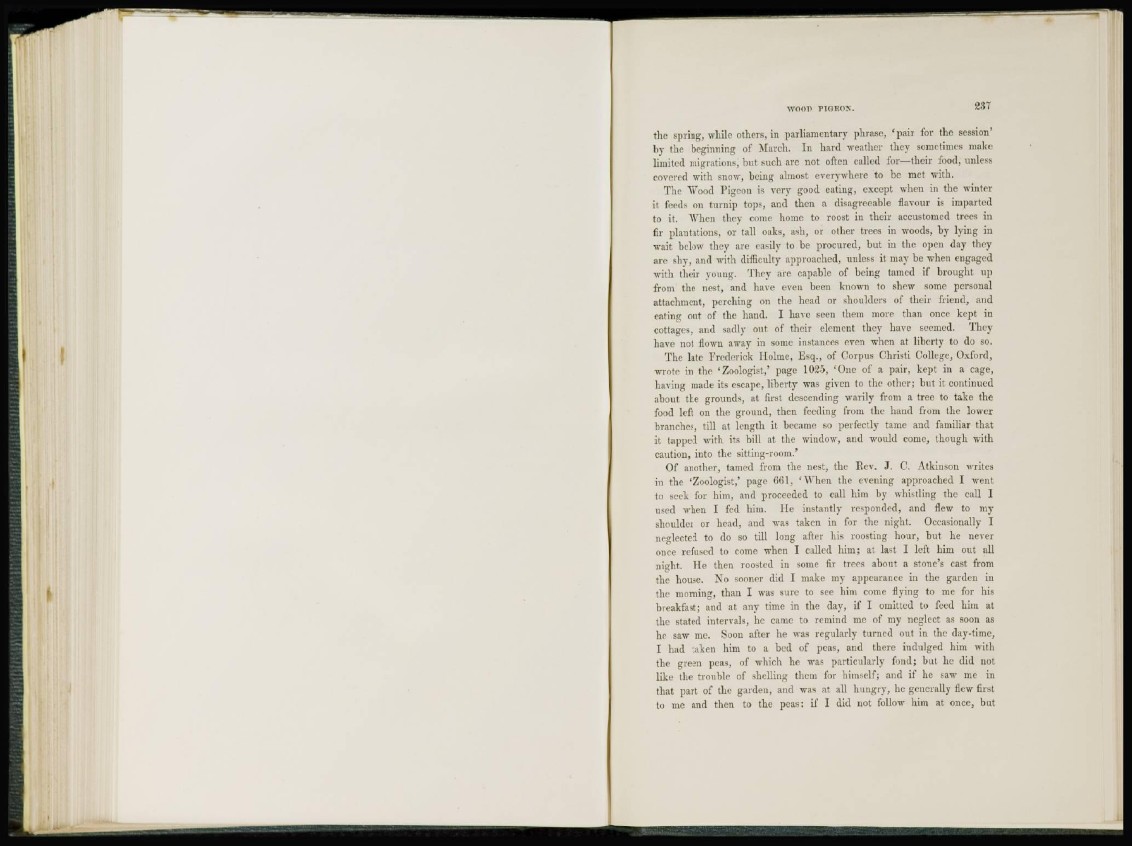
WOOll PIGEON. 237
the spring, while others, in parliamentary phrase, 'pair for the session'
by the beginning of March. In hard weather they sometimes make
limited migrations, but such are not often called for—their food, unless
covered with snow, being almost everywhere to be met with.
The Wood Pigeon is very good eating, except when in the winter
it feeds on turnip tops, and then a disagreeable flavour is imparted
to it. When they come home to roost in their accustomed trees in
fir plantations, or tall oaks, ash, or other trees in woods, by lying in
wait below they are easily to be procured, but in the open day they
are shy, and with difficulty approached, unless it may be when engaged
with their young. They are capable of being tamed if brought up
from the nest, and have even been known to shew some personal
attachment, perching on the head or shoulders of their friend, and
eating out of the hand. I have seen them more than once kept in
cottages, and sadly out of their element they have seemed. They
have not flown away in some instances even when at liberty to do so.
The late Frederick Holme, Esq., of Corpus Christ! College, Oxford,
wrote in the 'Zoologist,' page 1025, 'One of a pair, kept in a cage,
having made its escape, liberty was given to the other; but it continued
about the grounds, at first descending warily from a tree to take the
food left on the ground, then feeding from the hand from the lower
branches, till at length it became so perfectly tame and familiar that
it lapped with its bill at the window, and would come, though with
caution, into the sitting-room.'
Of another, tamed from the nest, the Rev. J. C. Atkinson writes
in the 'Zoologist,' page (¡61, ' W h e n the evening approached I went
to seek for him, and proceeded to call him by whistling the call I
used when I fed him. He instantly responded, and flew to my
shoulder or head, and was taken in for the night. Occasionally I
neglected to do so till long after his roosting hour, but he never
once refused to come when I called him; at last I left him out all
night. He then roosted in some fir trees about a stone's cast from
the house. No sooner did I make my appearance in the garden in
the morning, than I was sure to see him come flying to me for his
breakfast; and at any time in the day, if I omitted to feed him at
the stated intervals, he came to remind me of my neglect as soon as
he saw me. Soon after he was regularly turned out in the day-time,
I had taken him to a bed of peas, and there indulged him with
the green peas, of which he was particularly fond; but he did not
like the trouble of shelling them for himself; and if he saw me in
that part of the garden, and was at all hungry, he generally flew first
to me and then to the peas: if I did not follow him at once, but